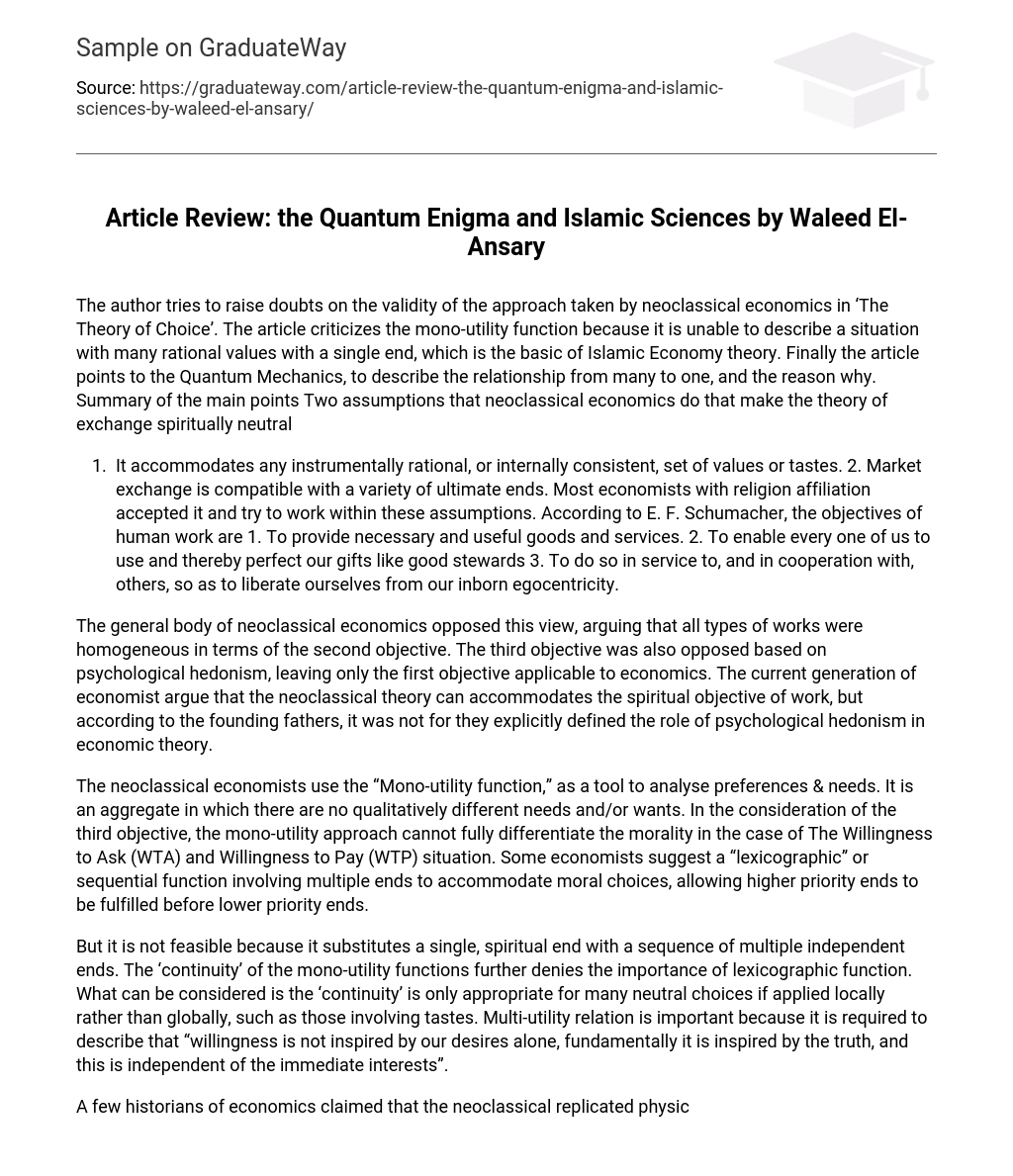In ‘The Theory of Choice’, the author questions the validity of the approach adopted by neoclassical economics. The critique focuses on the limitation of the mono-utility function, which fails to capture multiple rational values leading to a single goal, as advocated in Islamic Economy theory. The article ultimately suggests looking at Quantum Mechanics to understand the transition from many to one and its underlying factors. In summary, the main points highlight two assumptions made by neoclassical economics that render the theory of exchange spiritually neutral.
- It accommodates any instrumentally rational, or internally consistent, set of values or tastes. 2. Market exchange is compatible with a variety of ultimate ends. Most economists with religion affiliation accepted it and try to work within these assumptions. According to E. F. Schumacher, the objectives of human work are 1. To provide necessary and useful goods and services. 2. To enable every one of us to use and thereby perfect our gifts like good stewards 3. To do so in service to, and in cooperation with, others, so as to liberate ourselves from our inborn egocentricity.
The general body of neoclassical economics disagreed with this view, contending that all types of work were equal in terms of the second objective. The third objective was also opposed on the basis of psychological hedonism, leaving only the first objective relevant to economics. The current generation of economists argue that the neoclassical theory can incorporate the spiritual objective of work, but according to the founding fathers, it was not designed to do so as they explicitly defined the role of psychological hedonism in economic theory.
The neoclassical economists employ the “Mono-utility function” to analyze preferences and needs. This function aggregates all needs and wants without qualitative differentiation. However, when considering the third objective, the mono-utility approach fails to distinguish morality in The Willingness to Ask (WTA) and Willingness to Pay (WTP) situations. To address this, some economists propose a “lexicographic” or sequential function that incorporates multiple ends. This function allows for moral choices by prioritizing the fulfillment of higher priority ends before lower priority ends.
However, the notion of substituting a single, spiritual end with multiple independent ends is not feasible. The mono-utility functions’ emphasis on “continuity” also undermines the significance of the lexicographic function. It is worth considering that the concept of “continuity” may only be applicable to neutral choices on a local level rather than a global one, such as choices concerning personal preferences. The existence of multi-utility relations is crucial as it allows us to depict that our willingness is not solely driven by our desires but fundamentally by the truth, which remains unaffected by immediate interests.
According to some economists, the neoclassical school of economics attempted to impose a “unity of analytical tools” by replicating physics equations and using a mono-utility function. However, this effort to unify economic analysis compromises its effectiveness. Fortunately, Wolfgang Smith disproves this notion in his book The Quantum Enigma: Finding the Hidden Key, by showing that reducing quality to quantity doesn’t apply to either the natural world or the human realm.
According to the author, pre-modern scientists recognized the importance of distinguishing between physical and corporeal entities. This distinction is essential for the ontological foundation of the multi-utility relation in Islamic economic theory. The mono-utility approach lacks the ability to acknowledge qualitative variations in the corporeal domain. On the other hand, the combination of a lexicographic function and a multi-utility relation that prioritizes spiritual and other needs can effectively address this.
To summarize, the implementation of a public policy based on neoclassical preferences and mono-utility function results in policy failure and prioritizes psychological hedonism over intellectual discourse. On the other hand, an Islamic viewpoint that incorporates hierarchical levels of reality and integrates all aspects of life around a Sacred Centre presents a preferable alternative that aligns preferences, well-being, and freedom of choice. It is important to note that the article covers various topics extensively and demonstrates thorough research.
The article explores the philosophical aspect of the argument, referencing renowned figures such as E.F. Schumacher and Wolfgang Smith. The author effectively conveys these abstract and theoretical ideas while maintaining a neutral stance and avoiding excessive use of Islamist rhetoric, possibly to cater to a broader academic readership.
The paper’s weakness is its lack of original ideas or theories. Instead, the author gathers arguments from different sources and presents them concisely. Furthermore, the paper includes unwarranted personal attacks on respected figures in philosophy and economics, which is inappropriate for a scholarly work. It is crucial for arguments to be supported by logical and academic evidence rather than resorting to slanderous tactics.
The paper lacks a well-developed argument on the significance of Quantum Theory in economics. The author only relies on one point from the book ‘The Quantum Enigma’, which is insufficient to establish the theory’s relevance to understanding economics. Further research should focus on formulating a mathematical hypothesis that incorporates Quantum Theory, lexicographic function, and a multi-utility relation based on a hierarchy of spiritual and other needs. This can help demonstrate preferences and tastes across a broad range of human behavior and actions.





